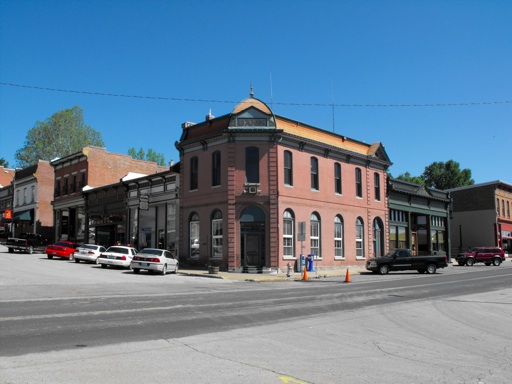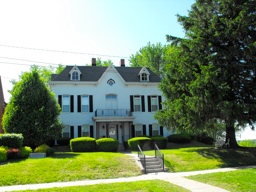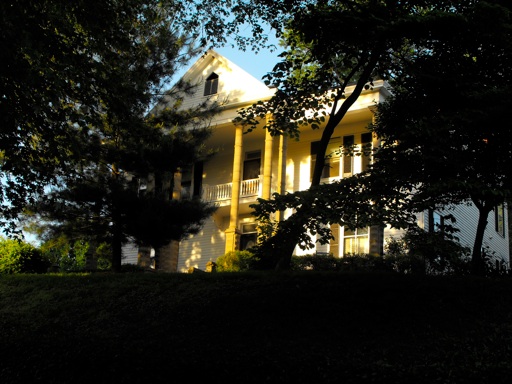Glasgow Missouri History

Thirty-two years after Lewis & Clark passed through on their way west,
the town of Glasgow was established in 1836 and named for one of its
thirteen original founders. Its early economy was reminiscent of the
Deep South, with slaves working hemp and tobacco plantations.
The town grew rapidly as a center for commerce and river trade.
Glasgow was the site of a Civil War battle in 1864 when Confederate troops
bombarded the Union forces holding the town. The Union force was outnumbered
and eventually forced to surrender. The Union forces were under the
command of COL Chester Harding. The Confederates were commanded by
BG John Bullock Clark.
At the end of the battle, the Union forces were
holding defensive positions at Hereford Hill. The large home there is now the rectory of St. Mary's Church.
Just a week after the battle, Bloody Bill Anderson, one of the most
notorious Bushwhackers of the time, came to Glasgow. He had recently
killed 23 unarmed Union soldiers in Centralia, Missouri, about
thirty-five miles to the east. Col. Benjamin Lewis was a Union
Man, who had made his fortune in tobacco. He offered a $6,000 reward for
Anderson. Anderson and his men broke into Glen Eden, Lewis' mansion, and
demanded the reward for himself. They beat and tortured Lewis until the
money was collected. One of the founders of the city, William Dunica,
provided the money to save Lewis. Dunica's impressive home, with its'
tall porch columns, still stands.
The large home there is now the rectory of St. Mary's Church.
Just a week after the battle, Bloody Bill Anderson, one of the most
notorious Bushwhackers of the time, came to Glasgow. He had recently
killed 23 unarmed Union soldiers in Centralia, Missouri, about
thirty-five miles to the east. Col. Benjamin Lewis was a Union
Man, who had made his fortune in tobacco. He offered a $6,000 reward for
Anderson. Anderson and his men broke into Glen Eden, Lewis' mansion, and
demanded the reward for himself. They beat and tortured Lewis until the
money was collected. One of the founders of the city, William Dunica,
provided the money to save Lewis. Dunica's impressive home, with its'
tall porch columns, still stands.
Two years later Lewis died as a result of the beating.
His will included a $10,000 endowment for books and the establishment
of a library and college in Glasgow. The two-story building featured a
library on the second floor and a lecture hall on the first floor.
The building still serves as Glasgow's public library and is the oldest
library building in continuous use west of the Mississippi. There were
two colleges in Glasgow, Lewis and Pritchett.

With trains replacing steamboats and the original settlers long since
gone to their reward, progress in Glasgow slowed by the end of the 1800s.
Both colleges failed. However, the world's first all-steel bridge was
constructed over the Missouri River in Glasgow in 1879, allowing Chicago
and Kansas City to be linked by rail. This bridge was demolished twenty
years later. The span built in 1899 still stands today. In the early years,
a ferry provided river crossing for vehicles. Eventually a highway bridge
was built. It was the first non-toll highway bridge over the Missouri River.
Glasgow now enjoys a new highway bridge.
Glasgow also boasts the oldest single family
owned drugstore in the United States.
Click for a Glasgow
SLIDE SHOW
Return to main page Click Here
URL: http://www.jymiller.net/zzhistory.html
Site last updated 25 MAY 2013. © 2011


 The large home there is now the rectory of St. Mary's Church.
Just a week after the battle, Bloody Bill Anderson, one of the most
notorious Bushwhackers of the time, came to Glasgow. He had recently
killed 23 unarmed Union soldiers in Centralia, Missouri, about
thirty-five miles to the east. Col. Benjamin Lewis was a Union
Man, who had made his fortune in tobacco. He offered a $6,000 reward for
Anderson. Anderson and his men broke into Glen Eden, Lewis' mansion, and
demanded the reward for himself. They beat and tortured Lewis until the
money was collected. One of the founders of the city, William Dunica,
provided the money to save Lewis. Dunica's impressive home, with its'
tall porch columns, still stands.
The large home there is now the rectory of St. Mary's Church.
Just a week after the battle, Bloody Bill Anderson, one of the most
notorious Bushwhackers of the time, came to Glasgow. He had recently
killed 23 unarmed Union soldiers in Centralia, Missouri, about
thirty-five miles to the east. Col. Benjamin Lewis was a Union
Man, who had made his fortune in tobacco. He offered a $6,000 reward for
Anderson. Anderson and his men broke into Glen Eden, Lewis' mansion, and
demanded the reward for himself. They beat and tortured Lewis until the
money was collected. One of the founders of the city, William Dunica,
provided the money to save Lewis. Dunica's impressive home, with its'
tall porch columns, still stands.

